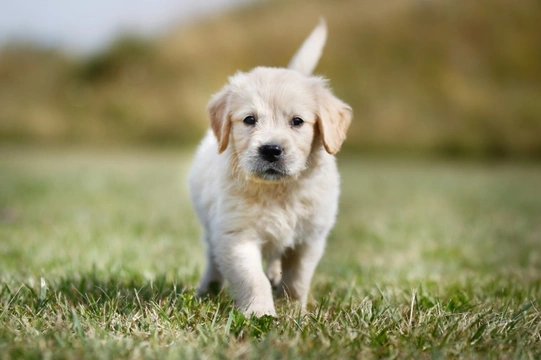
Ten things you need to know about the golden retriever before you buy one
The golden retriever is one of the most popular dog breeds in the UK overall, and one that most dog lovers can recognise instantly. They have long been a common sight on the streets and in the dog parks all over the country, and as well as making for great pets, are also widely used as assistance dogs and therapy dogs too, as well as within a number of other working roles as well.
The golden retriever is also one of the most personable dog breeds of them all and this, coupled with their distinctive good looks, means that thousands of people every year consider buying a dog of the breed to join their families.
A very versatile breed, the golden retriever can be an excellent match for many different types of homes – but they’re not for everyone, and a lot of research into the breed is needed before you make a decision to choose a dog of this type.
With this in mind, this article will tell you ten things you need to know about the golden retriever before you buy one, to help you to make an informed choice. Read on to learn more.
Golden retrievers are really clever
First of all, golden retrievers are one of the smartest dog breeds of them all, and they’re ranked in fourth place on the Coren ranking of canine intelligence by breed, out of a total number of 138 different dog breeds.
This means that golden retrievers can learn and execute a wide range of different commands reliably, but it does also mean that they tend to get bored easily and need a lot of mental stimulation and entertainment too!
They’re also really energetic and need lots of exercise
As well as being smart, the golden retriever is a very high energy dog breed, which needs a significant amount of daily exercise in order to keep them happy and fulfilled. They are best suited to active families that like to spend lots of time outside, and require a minimum of two hours of interesting, varied walks per day and ideally more in order to thrive.
They are large, rangy dogs
The golden retriever is a large dog breed, and falls towards the higher end of the size spectrum in terms of both height and weight. Coupled with this, their prolific coats also make dogs of the breed look even larger, and they’re long and not overly lean as a rule.
This means that they need a large home and garden in order to be comfortable, so if you live in an apartment or small home, this is probably not a good breed to choose.
Golden retrievers aren’t cheap to buy or keep
Golden retrievers are not among the cheapest of dog breeds to buy, with the average asking price for pedigree dogs of the breed being around the £1,000 mark. Additionally, as a large breed they also need lots of food, and they aren’t cheap to keep in general, needing everything in big sizes.
Even the cost of flea and worming treatments and pet insurance is higher for the golden retriever than for most other breeds, so bear this in mind.
The breed is really versatile and has lots of skills
Golden retrievers have a huge amount of great traits including their intelligence, kind tempers and good looks, and their versatility is virtually unmatched in other breeds. As well as making for excellent pets, they have a wide range of working applications too, in roles as diverse as assistance dog duties, therapy dog work, sniffer dog roles, and as competent competitors in canine sports in many cases too.
Additionally, as a retrieving breed first and foremost, the golden retriever also has a long history as a great gun dog.
They shed prolifically all year round
One thing all prospective golden retrievers should note is that this is a breed that sheds a lot of fur, and they tend to do so all year round. This means they need daily brushing and grooming, and that clearing up around them in the house can be very time consuming too.
They love the water
Most golden retrievers have a natural affinity for the water and love to swim, as reflected by their historical working role as a retrieving gun dog.
They tend to be excellent strong swimmers, and usually have to be trained not to get into the water without a command rather than needing to be encouraged to get their paws wet!
Golden retrievers have some complex health challenges
The golden retriever has an average lifespan of around 10-12 years, and there are a number of hereditary health challenges that can be found within the breed as a whole.
Anyone considering buying a golden retriever is cautioned to research the breed’s health in depth before making a final decision on a purchase, and to talk to any breeder they are considering buying from about the health of their individual breed lines.
They’re food obsessed
Most dogs are highly motivated by food, but the golden retriever is more so than most, and this means that dogs of the breed often beg and scavenge, and need lots of supervision to ensure that they don’t eat something they shouldn’t!
They also have a tendency to put on weight easily, and so this needs to be managed carefully throughout their lives.
Golden retrievers are particularly good with children
Finally, dogs of the breed are real ambassadors for the dog world in general, and assuming that they are properly trained and managed, tend to be excellent with children. They are kind, gentle and affectionate, although their large size means they might accidentally knock smaller children over, and they are honest dogs in terms of rarely snapping or being in any way unpredictable or untrustworthy.



